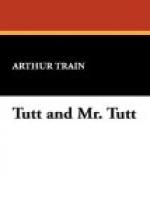He subsided, panting.
Tutt bowed complacently.
“I move that the witness’ remarks be stricken out on the grounds first, that they are unresponsive; second, that they are irrelevant, incompetent and immaterial; third, that they contain expressions of opinion and hearsay; and fourth, that they are abusive and generally improper.”
“Strike them out!” directed Judge Witherspoon. Then he turned to Tunnygate. “The essence of your testimony is that the defendant set a dog on you, is it not? You had quarreled with the defendant, with whom you had formerly been on friendly terms. You entered on premises claimed to be owned by him, though a sign warned you to beware of a dog. The dog attacked and bit you? That’s the case, isn’t it?”
“Yes, Your Honor.”
“Had you ever seen that dog before?”
“No, sir.”
“Do you know where he got it?”
“My wife told me—”
“Never mind what your wife told you. Do you—”
“He don’t know where the dog came from, judge!” suddenly called out Mrs. Tunnygate in strident tones from where she was sitting. “But I know!” she added venomously. “That woman of his got it from—”
Judge Witherspoon fixed her coldly with an impassive and judicial eye.
“Will you kindly be silent, madam? You will no doubt be given an opportunity to testify as fully as you wish. That is all, sir, unless Mr. Tutt has some more questions.”
Tutt waved the witness from the stand contemptuously.
“Well, I’d like a chance to testify!” shrilled Mrs. Tunnygate, rising in full panoply.
“This way, madam,” said the clerk, motioning her round the back of the jury box. And she swept ponderously into the offing like a full-rigged bark and came to anchor in the witness chair, her chin rising and falling upon her heaving bosom like the figurehead of a vessel upon a heavy harbor swell.
Now it has never been satisfactorily explained just why the character of an individual should be in any way deducible from such irrelevant attributes as facial anatomy, bodily structure or the shape of the cranium. Perhaps it is not, and in reality we discern disposition from something far more subtle—the tone of the voice, the expression of the eyes, the lines of the face or even from an aura unperceived by the senses. However that may be, the wisdom of the Constitutional safeguard guaranteeing that every person charged with crime shall be confronted by the witnesses against him was instantly made apparent when Mrs. Tunnygate took the stand, for without hearing a word from her firmly compressed lips the jury simultaneously swept her with one comprehensive glance and turned away. Students of women, experienced adventurers in matrimony, these plumbers, bird merchants “delicatessens” and the rest looked, perceived and comprehended that here was the very devil of a woman—a virago, a shrew, a termagant, a natural-born trouble-maker; and they shivered and thanked God that she was Tunnygate’s and not theirs; their unformulated sentiment best expressed in Pope’s immortal couplet:




